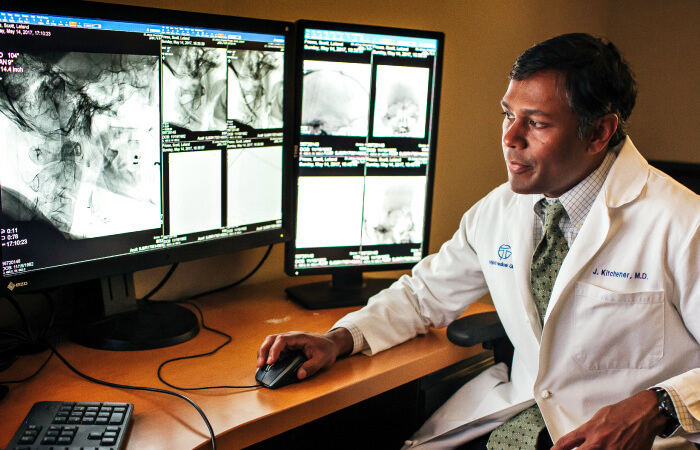Radiology
The radiologists at HSHS St. Francis Hospital blend the latest radiological technology with the highest standard of patient care to get fast and accurate results.

While many outpatient procedures can be performed on a "walk in" basis, there are some exams that require a fasting period prior to the test and a radiologist be present for the exam. For this reason, it is always best to call the Radiology Department at 217-324-8446 to find out if an appointment is needed. Please note all radiology exams require a written or phoned-in order from your physician. Our Radiology Department performs over 30,000 diagnostic procedures each year. Radiologists can view exams and reports over the Internet almost instantly.
3D mammography services are now available at HSHS St. Francis Hospital. The new 3D mammography equipment is the latest imaging technology and increases the detection rate of invasive breast cancer by 40 percent. With a scan time of less than 4 seconds, this new machine is faster and more accurate as it reduces the need for follow-up imaging.
Learn more.
Learn more.
A CT scan creates cross-sectional images (like slices) of inside the body with a great level of precision with the lowest dose possible.
HSHS St. Francis Hospital offers bone density (DEXA) scans which measure bone loss and deterioration.
Together, the following five steps can optimize bone health and help prevent osteoporosis:
Together, the following five steps can optimize bone health and help prevent osteoporosis:
- Get the daily recommended amounts of calcium and vitamin D
- Engage in regular weight-bearing and muscle-strengthening exercise
- Avoid smoking and excessive alcohol
- Talk to your health care provider about bone health
Digital X-rays: Digital x-rays are used to take images of the extremities, pelvis, head/face, ribs and shoulder/clavicle. Barium exams of the stomach and small bowel are also available.
By combining radio frequency waves with a strong magnetic field, our MRI unit creates remarkably clear and detailed pictures of internal organs and tissues. This is valuable in diagnosing cancer, vascular disease, stroke and joint musculoskeletal disorders. The wide/short bore MRI machine at St. Francis helps patients who suffer from claustrophobia. It can also accommodate nearly every patient thanks to its higher weight capacity.
Nuclear medicine uses radioactive substances to image the body and treat disease. These images are useful to detect heart problems, thyroid disorders and bone disease.
HSHS St. Francis Hospital offers a wide variety of nuclear medicine imaging services. Nuclear medicine tests differ from most other imaging in that diagnostic tests primarily show the physiological function of the system being investigated. We can perform bone scans, liver/spleen scans, GI bleed studies, gastric emptying studies and more.
HSHS St. Francis Hospital offers a wide variety of nuclear medicine imaging services. Nuclear medicine tests differ from most other imaging in that diagnostic tests primarily show the physiological function of the system being investigated. We can perform bone scans, liver/spleen scans, GI bleed studies, gastric emptying studies and more.
Ultrasounds uses high frequency ultrasound waves to produce images. It is used for diagnosis, management and follow-up in many areas, but is particularly useful for obstetric, gynecologic and pediatric imaging. This technology is also used for rapid diagnosis of medical, surgical, obstetrical and gynecologic emergencies.